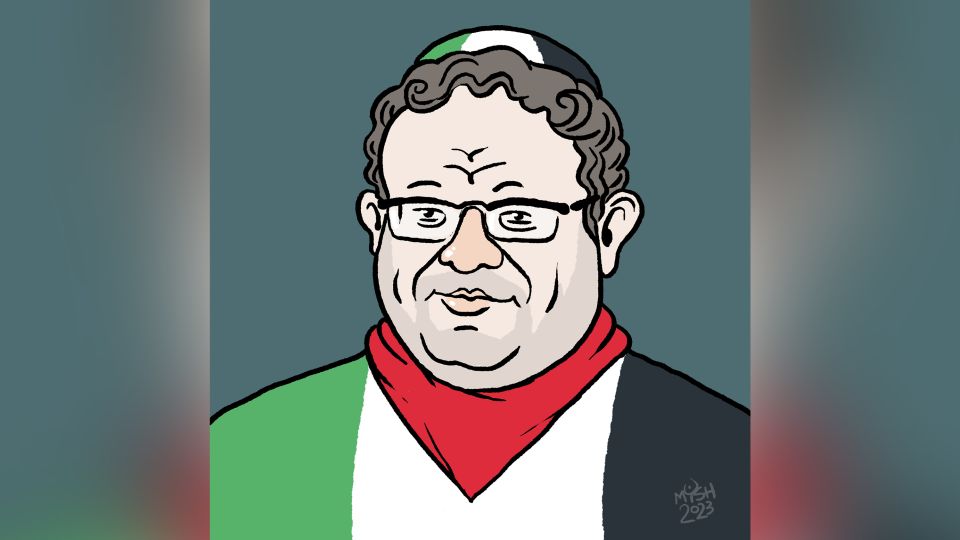
-
Published: 26 January 2023

25- Jan.- 2023
Juls Mcmahon- Tel Aviv
In a new escalating to the hottie situation in Palestine- Israel, Israeli National Security Minister Itamar Ben Gvir ordered police to take down Palestinian flags in any public place in Israel, claiming they are a rallying symbol for terrorists.
but artist Michael Rozanov tried to do something as a reply to the Israeli minister who behave with the full meaning of racism, the artist drew himself in the colors of the Palestinian flag and added the artwork to his Facebook profile picture, which moved to a trend around the world, in a sudden of the artist himself.
“It’s ridiculous, you want to take down flags? What if I am a flag, what would you do? Would you put me down because I’m wearing certain colors?” said Rozanov, known as Mysh. “So I drew this illustration that took me 10 minutes.”
What is noticeable is that dozens of Israelis joined Mysh, asking him to draw their profile pictures with the Palestinian flag in the hope of making some impact.
“And then I thought, yeah, it would be nice to offer other people to join in. Because I like drawing and I like starting something online,” Mysh told CNN .
Naturally, he also drew Ben Gvir clothed in the colors of the Palestinian flag, right up to his kippa, the skullcap worn by religious Jews.

Mysh is far from the only Israeli unhappy with Netanyahu’s new government. The prime minister’s right-wing coalition won a slim majority of the popular vote in November’s elections, but critics and opponents object to a wide range of its moves, including the Palestinian flag public ban, increased deference to the ultra-Orthodox and plans to change the judicial system.
More than 100,000 people turned out in Tel Aviv on Saturday night, the latest – and largest – in a series of weekly protests against legal reforms Netanyahu’s allies are planning.
But of course, not all the Israelis welcomed Mysh’s drawings.
An artist who uses different media – film and animation, illustration and comics – to address social and political issues, as well as sexuality and gender, Mysh came to Israel as a teenager from Latvia in 1993 and served in its army for three years.
But one day doing his reserve service at an Israeli checkpoint in the Jordan Valley, he says he had a powerful insight into the Palestinian experience.
“The only reason that checkpoint existed was to make the life of the people in the village more difficult,” Mysh said. “We were checking the same people twice every day. They were mostly mothers who take their children to kindergarten on the other side of the village.”
“There was a day when I was standing there with my gun and another soldier was checking ID cards, and suddenly I realized that I am a grown-up man who points a gun at a 3-year-old child. And I say to myself: ‘I’m not really pointing at him. I’m just standing like this.’ Yeah, but he doesn’t know that. What he sees is this scary creature pointing a f**king gun.”
“It suddenly hit me, the perspective of the other side, which is this child that twice a day sees this monster pointing a gun at him. What are the chances that this child grows up being ready to see me as a human being as I am? How can I expect him to perceive me as a human being? Then I decided I’m out of this. I’m not doing this anymore,” Mysh said.
Mysh sees a direct connection between Israel’s military checkpoints and Ben Gvir’s attempt to essentially ban the Palestinian flag, which is likely to be tested in court.
“Every oppressive system is a weak system because it can’t withstand any friction,” Mysh argued. “It needs to enforce a huge amount of violence to avoid friction.”
That is what Ben Gvir is trying to achieve, Mysh said: “It is an idea that in order to achieve our national identity, we need to take it away from other people.”
